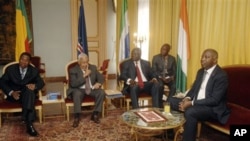The window for a diplomatic solution to Ivory Coast's violent, month-long political crisis appears to be narrowing, as tensions continue to mount.
A crowd attacked a U.N. convoy in Abidjan Tuesday, and an ECOWAS delegation left Abidjan empty-handed after urging incumbent president, Laurent Gbagbo, to step down peacefully and end the bloody political showdown following last month's disputed election. The delegation will return to Ivory Coast next week.
The presidents of Benin, Sierra Leone and Cape Verde met with incumbent president, Laurent Gbagbo, in Abidjan Tuesday to deliver an ultimatum, on behalf of West African regional bloc, ECOWAS: Mr. Gbagbo can step down peacefully or face removal by force.
It was to be Mr. Gbagbo's final chance. However the ECOWAS delegation returned to Abuja Tuesday night without Mr. Gbagbo, whom they were expected to offer political asylum. Nigerian President Goodluck Jonathan said the delegation will return to Ivory Coast to resume negotiations with Mr. Gbagbo next Monday.
Cape Verde president, Pedro Pires, says we cannot think in terms of success or failure. He says what we know is that we have done valid work here, not more than that.
The ECOWAS delegation also met with U.N.-endorsed presidential election winner, Alassane Ouattara, at his headquarters in an Abidjan hotel protected by U.N. peacekeepers and former rebel fighters.
Both Mr. Ouattara and Mr. Gbagbo claimed victory in the November 28 presidential runoff. The dispute has led to a tense political power struggle that the United Nations says has already killed more than 170 people and many worry could re-ignite a civil war.
Many Ivorians, weary after nearly a decade of crisis, are putting their hope in ECOWAS, while others say its efforts may be too little, too late.
Abidjan resident, Noel Gakpa, says ECOWAS should not have waited for this to become venomous. He says at this point, we do not know how it will end and now it is as if we are frantically trying to sort it out. He says they waited for the fire to start burning before coming to put it out.
ECOWAS has suspended Ivory Coast and is but one of many foreign powers, including the European Union, the African Union and the United States, that is calling on Mr. Gbagbo to step down.
An increasingly isolated and defiant Laurent Gbagbo shows no signs of caving. Speaking on state television Tuesday, Gbagbo spokesman, Ahoua Don Melo, says the Gbagbo government will sever ties with any government that recognizing envoys sent by Mr. Ouattara by ending the missions of those countries’ ambassadors in Ivory Coast.
Mr. Gbagbo has saved some of his bitterest reproaches for the United Nations and its mission in Ivory Coast, whom he accuses of meddling in Ivory Coast's affairs.
The United Nations says its 10,000-member peacekeeping force will remain in Ivory Coast on an impartial mandate to protect civilians, despite Mr. Gbagbo's demands it withdraw.
The United Nations says a large crowd attacked a U.N. convoy Tuesday in the Yopougon neighborhood of Abidjan, injuring one peacekeeper with a machete and burning a U.N. vehicle.
A Yopougon resident says the U.N. arrived with four tanks and tried to cross. He says everyone was on alert and came out to make them go back to their base. He says they should just go back there, we do not need them here.
The United Nations said calm was restored after intervention from Ivorian armed forces chief, General Philippe Mangou.
Witnesses in Abidjan say a nationwide strike, called for by Mr. Ouattara's camp Monday, is gaining momentum in pro-Ouattara neighborhoods with taxi drivers not working and public transportation grinding to a halt.




